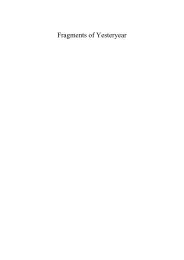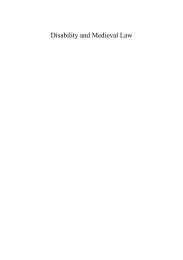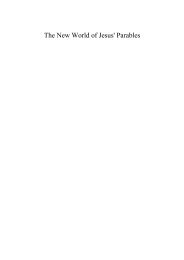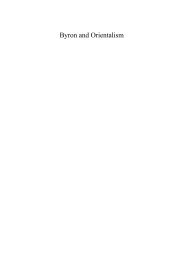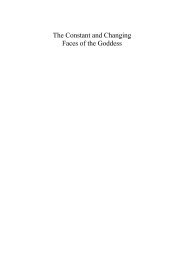Sample pdf - Cambridge Scholars Publishing
Sample pdf - Cambridge Scholars Publishing
Sample pdf - Cambridge Scholars Publishing
You also want an ePaper? Increase the reach of your titles
YUMPU automatically turns print PDFs into web optimized ePapers that Google loves.
The Amateur Emigrant 15<br />
number of acquaintances in that part of the ship, Mr. Jones and I paid it a late visit.<br />
Steerage No. 1 is shaped like an isosceles triangle, the sides opposite the equal<br />
angles bulging outward with the contour of the ship. It is lined with eight pens of<br />
sixteen bunks apiece, four bunks below and four above on either side. At night the<br />
place is lit with two lanterns, one to each table. As the steamer beat on her way<br />
among the rough billows, the light passed through violent phases of change, and<br />
was thrown to and fro and up and down with startling swiftness. You were tempted<br />
to wonder, as you looked, how so thin a glimmer could control and disperse such<br />
solid blackness. When Jones and I entered we found a little company of our<br />
acquaintances seated together at the triangular foremost table. A more forlorn<br />
party, in more dismal circumstances, it would be hard to imagine. The motion here<br />
in the ship's nose was very violent; the uproar of the sea often overpoweringly<br />
loud. The yellow flicker of the lantern spun round and round and tossed the<br />
shadows in masses. The air was hot, but it struck a chill from its fœtor. From all<br />
round in the dark bunks, the scarcely human noises of the sick joined into a kind of<br />
farmyard chorus. In the midst, these five friends of mine were keeping up what<br />
heart they could in company. Singing was their refuge from discomfortable<br />
thoughts and sensations. One piped, in feeble tones, "O why left I my hame?"<br />
which seemed a pertinent question in the circumstances. Another, from the<br />
invisible horrors of a pen where he lay dog-sick upon the upper shelf, found<br />
courage, in a blink of his sufferings, to give us several verses of the "Death of<br />
Nelson"; and it was odd and eerie to hear the chorus breathe feebly from all sorts<br />
of dark corners, and "this day has done his dooty" rise and fall and be taken up<br />
again in this dim inferno, to an accompaniment of plunging, hollow-sounding bows<br />
and the rattling spray-showers overhead.<br />
All seemed unfit for conversation; a certain dizziness had interrupted the activity of<br />
their minds; and except to sing they were tongue-tied. There was present, however,<br />
one tall, powerful fellow of doubtful nationality, being neither quite Scotsman nor<br />
altogether Irish, but of surprising clearness of conviction on the highest problems.<br />
He had gone nearly beside himself on the Sunday, because of a general<br />
backwardness to indorse his definition of mind as "a living, thinking substance<br />
which cannot be felt, heard, or seen"—nor, I presume, although he failed to<br />
mention it, smelt. Now he came forward in a pause with another contribution to our<br />
culture.<br />
"Just by way of change," said he, "I'll ask you a Scripture riddle. There's profit in<br />
them too," he added ungrammatically.<br />
This was the riddle—<br />
C and P<br />
Did agree<br />
To cut down C;<br />
But C and P<br />
Could not agree



